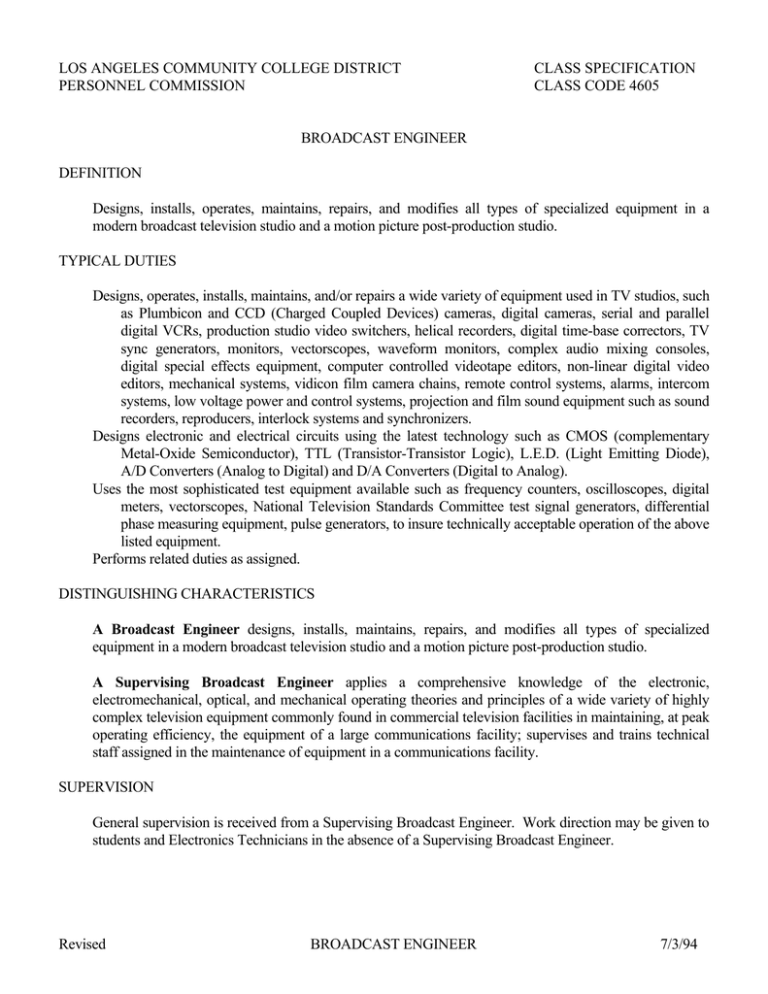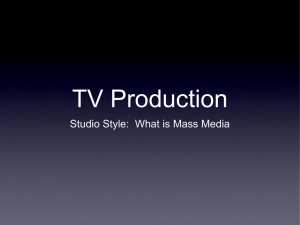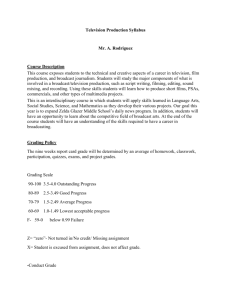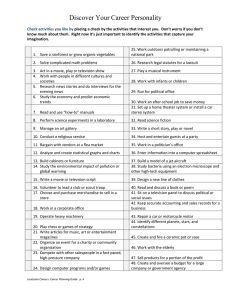LOS ANGELES COMMUNITY COLLEGE DISTRICT CLASS SPECIFICATION PERSONNEL COMMISSION CLASS CODE 4605
advertisement

LOS ANGELES COMMUNITY COLLEGE DISTRICT PERSONNEL COMMISSION CLASS SPECIFICATION CLASS CODE 4605 BROADCAST ENGINEER DEFINITION Designs, installs, operates, maintains, repairs, and modifies all types of specialized equipment in a modern broadcast television studio and a motion picture post-production studio. TYPICAL DUTIES Designs, operates, installs, maintains, and/or repairs a wide variety of equipment used in TV studios, such as Plumbicon and CCD (Charged Coupled Devices) cameras, digital cameras, serial and parallel digital VCRs, production studio video switchers, helical recorders, digital time-base correctors, TV sync generators, monitors, vectorscopes, waveform monitors, complex audio mixing consoles, digital special effects equipment, computer controlled videotape editors, non-linear digital video editors, mechanical systems, vidicon film camera chains, remote control systems, alarms, intercom systems, low voltage power and control systems, projection and film sound equipment such as sound recorders, reproducers, interlock systems and synchronizers. Designs electronic and electrical circuits using the latest technology such as CMOS (complementary Metal-Oxide Semiconductor), TTL (Transistor-Transistor Logic), L.E.D. (Light Emitting Diode), A/D Converters (Analog to Digital) and D/A Converters (Digital to Analog). Uses the most sophisticated test equipment available such as frequency counters, oscilloscopes, digital meters, vectorscopes, National Television Standards Committee test signal generators, differential phase measuring equipment, pulse generators, to insure technically acceptable operation of the above listed equipment. Performs related duties as assigned. DISTINGUISHING CHARACTERISTICS A Broadcast Engineer designs, installs, maintains, repairs, and modifies all types of specialized equipment in a modern broadcast television studio and a motion picture post-production studio. A Supervising Broadcast Engineer applies a comprehensive knowledge of the electronic, electromechanical, optical, and mechanical operating theories and principles of a wide variety of highly complex television equipment commonly found in commercial television facilities in maintaining, at peak operating efficiency, the equipment of a large communications facility; supervises and trains technical staff assigned in the maintenance of equipment in a communications facility. SUPERVISION General supervision is received from a Supervising Broadcast Engineer. Work direction may be given to students and Electronics Technicians in the absence of a Supervising Broadcast Engineer. Revised BROADCAST ENGINEER 7/3/94 CLASS QUALIFICATIONS Knowledge of: Principles of electricity (AC and DC), electronics, sound, optics, physics, semiconductors, magnetics, and electromagnetic propagation Advanced electronic principles such as A/D and D/A conversion, and digital processing and digital computers Installation, operation, repair, and maintenance of equipment used in television studios Troubleshooting techniques used in detecting malfunctions of television studio equipment Broadcast television test equipment Basic operations of computer equipment Ability to: Design, operate, repair, and adjust equipment used in television studios Use TV broadcast test equipment Read and understand schematic diagrams Deal tactfully and effectively with campus personnel and students Learn general and specialized computer equipment ENTRANCE QUALIFICATIONS Education and Experience: Forty-five semester units of college level courses in electronics or 700 hours of formal training in electronics. AND Two years of paid technical engineering work in a television broadcasting or commercial video production environment, including commercial television, public television, educational television, corporate television, Armed Forces television, or some combination thereof. The experience must have included responsibility for maintenance of all equipment typically found in a television broadcasting or video production environment. Two additional years of the above-stated experience may substitute for the educational requirement. Special: A FCC General Radio Telephone license or Society of Broadcast Engineers Certification is desirable. Revised BROADCAST ENGINEER 7/3/94





